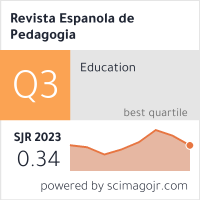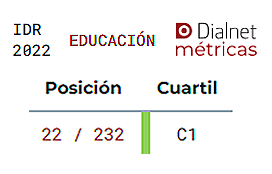«Empecé a preguntarme si me estoy volviendo emocionalmente insensible». Antecedentes socioculturales, currículo oculto y autorreflexión moral en el desarrollo de la identidad profesional médica: un estudio cualitativo
DOI
10.22550/2174-0909.4627
Abstract
The focus of our study is personal, emotional, and moral development of medical students in the context of their medical school experience, and the impact of hidden curriculum on the formation of their professional identity. We conducted interviews with 26 fourth-year students and analysed them by methods of content and discourse analysis. Several factors impacting the adaptation to the medical environment and the adoption of professional identity emerged as significant: their sociocultural background, the institutional culture of medical school, and the practice of moral self-reflection. The adaptation to medical environments and the appropriation of professional roles come more easily to students from medical families, yet present significant challenges to students from non-medical families who are more likely to be impacted by both positive and negative aspects of the hidden curriculum. Students who expressed moral self-reflection were capable of critically assessing the impact of the medical environment on their personal and professional development. We suggest that the provision of safe space for students to reflect on their subjective experiences might be both an educational and therapeutic intervention supporting development of moral and professional integrity, while faculty mentorship might partially compensate for the lack of privilege of medical family background.
Referencias | References
Al-Rumayyan, A., Van Mook, W. N. K. A., Magzoub, M. E., Al-Eraky, M. M., Ferwana, M., Khan, M. A., & Dolmans, D. (2017). Medical professionalism frameworks across non-Western cultures: Anarrative overview. Medical Teacher, 39(sup1), S8-S14. https://doi.org/10.1080/0142159X.2016.1254740
Boerboom, T. B., Jaarsma, D., Dolmans, D. H., Scherpbier, A. J., Mastenbroek, N. J., & Van Beukelen, P. (2011). Peer group reflection helps clinical teachers to critically reflect on their teaching. Medical Teacher, 33(11), e615-e623. https://doi.org/10.3109/0142159X.2011.610840
Bourdieu, P. (1977). Outline of a theory of practice (R. Nice, Trans.). Cambridge University Press.
Cambridge Dictionary. (n. d.). Self-reflection. Retrieved February 5, 2024, from https://dictionary.cambridge.org/dictionary/english/self-reflection
Choi, K. J., Tak, H. J., Bach, C., Trias, C., Warsi, H., Abraham, J., & Yoon, J. D. (2018). Characteristics of medical students with physician relatives: A national study. MedEdPublish (2016), 7, 30. https://doi.org/10.15694/mep.2018.0000030.1
Cruess, R. L., Cruess, S. R., Boudreau, J. D., Snell, L., & Steinert, Y. (2014). Reframing medical education to support professional identity formation. Academic Medicine: Journal of the Association of American Medical Colleges, 89(11), 1446-1451. https://doi.org/10.1097/ACM.0000000000000427
David, A. (2017). Self-reflection in illness and health: Literal and metaphorical? Palgrave Communications, 3, 17091.
Edgar, A., & Pattison, S. (2011). Integrity and the moral complexity of professional practice.
Nursing Philosophy, 12(2), 94-106. https://doi.org/10.1111/j.1466769X.2010.00481.x
Epstein, R. M., & Hundert, E. M. (2002). Defining and assessing professional competence. JAMA, 287(2), 226-235. https://doi.org/10.1001/jama.287.2.226
Farkas, A. H., Allenbaugh, J., Bonifacino, E., Turner, R., & Corbelli, J. A. (2019). Mentorship of US medical students: A systematic review. Journal of General Internal Medicine, 34(11), 2602-2609. https://doi.org/10.1007/s11606-019-05256-4
Fokas, J. A., & Coukos, R. (2023). Examining the hidden curriculum of medical school from a first-generation student perspective. Neurology, 101(4), 187-190. https://doi.org/10.1212/WNL.0000000000207174
Gay, G. (2018). Culturally responsive teaching: Theory, research, and practice. Teachers College Press.
Gomes, A. P., & Rego, S. (2013). Pierre Bourdieu and medical education. Revista Brasileira de Educação Médica, 37(2), 260-265.
Gore, J., Holmes, K., Smith, M., & Fray, L. (2015). Investigating the factors that influence the choice of teaching as a first career. A report commissioned by the Queensland College of Teachers. Queensland College of Teachers. https://cdn.qct.edu.au/pdf/Research/WhyPeopleChooseTeachingLiteratureReview.pdf
Gray, P. (2015). Free to learn: Why unleashing the instinct to play will make our children happier, more self-reliant, and better students for life. Basic Books.
Hafferty, F. W., & Franks, R. (1994). The hidden curriculum, ethics teaching, and the structure of medical education. Academic Medicine: Journal of the Association of American Medical Colleges, 69(11), 861-871. https://doi.org/10.1097/00001888-199411000-00001
Hafferty, F. W., & O’Donnell, J. F. (Eds.). (2015). The hidden curriculum in health professional education (1st ed.). Dartmouth College Press.
Mann, K., Gordon, J., & MacLeod, A. (2009). Reflection and reflective practice in health professions education: A systematic review. Advances in Health Sciences Education: Theory and Practice, 14(4), 595-621. https://doi.org/10.1007/s10459-007-9090-2
Mansour, N. (2013). Modelling the sociocultural contexts of science education: The teachers’ perspective. Research in Science Education, 43(3), 347-369. https://doi.org/10.1007/s11165-011-9269-7
Martimianakis, M. A., Michalec, B., Lam, J., Cartmill, C., Taylor, J. S., & Hafferty, F. W. (2015). Humanism, the hidden curriculum, and educational reform: A scoping review and thematic analysis. Academic Medicine: Journal of the Association of American Medical Colleges, 90(11 Suppl), S5-S13. https://doi.org/10.1097/ACM.0000000000000894
Meltzer, C. (2020). The reflexive practitioner: Using arts-based methods and research for professional development. In L. McKay, G. Barton, S. Garvis, & V. Sappa (Eds.), Arts-based research, resilience and well-being across the lifespan (pp. 201-220). Palgrave Macmillan.
Merleau-Ponty, M. (2002). Phenomenology of perception. Routledge.
Mezirow, J. (1997). Transformative learning: Theory to practice. New Directions for Adult and Continuing Education, 1997(74), 5-12. https://doi.org/10.1002/ace.7401
Moss, F., & McManus, I. C. (1992). The anxieties of new clinical students. Medical Education, 26(1), 17-20. https://doi.org/10.1111/j.1365-2923.1992.tb00116.x
Olsson, C., Kalén, S., & Ponzer, S. (2019). Sociological analysis of the medical field: Using Bourdieu to understand the processes preceding medical doctors’ specialty choice and the influence of perceived status and other forms of symbolic capital on their choices. Advances in Health Sciences Education: Theory and Practice, 24(3), 443-457. https://doi.org/10.1007/s10459-018-09872-3
Ottrey, E., Rees, C. E., Kemp, C., Lyons, K. M., Brock, T. P., Leech, M., Monrouxe, L. V., & Palermo, C. (2024). Exploring preparedness transitions in medicine and pharmacy: A qualitative longitudinal study to inform multiprofessional learning opportunities. Advances in Health Sciences Education. https://doi.org/10.1007/s10459-024-10372-w
Pinkasová, T. (2022). Supporting moral development in medical students through an elective course focused on moral self-reflection. Theology and Philosophy of Education, 1(1), 18-23. https://www.tape.academy/index.php/tape/article/view/7
Polyakova, M., Persson, P., Hofmann, K., & Jena, A. B. (2020). Does medicine run in the family? Evidence from three generations of physicians in Sweden: Retrospective observational study. BMJ, 371, m4453. https://doi.org/10.1136/bmj.m4453
Radcliffe, C., & Lester, H. (2003). Perceived stress during undergraduate medical training: A qualitative study. Medical Education, 37(1), 32-38. https://doi.org/10.1046/j.1365-2923.2003.01405.x
Richards, H., Polnay, A., Wilkinson, P., Read, E., & Young, H. (2020). Balint-style reflective practice groups in a year 4 undergraduate general practice attachment: Experience of the first two years. Scottish Medical Journal, 65(2), 52-59. https://doi.org/10.1177/0036933020918056
Romero, R., Miotto, K., Casillas, A., & Sanford, J. (2020). Understanding the experiences of first-generation medical students: Implications for a diverse physician workforce. Academic Psychiatry, 44(4), 467-470. https://doi.org/10.1007/s40596-020-01235-8
Ryder, C. Y., Irani, S., Andreski, P., & Grob, K. (2022). Evaluating the effects and contributing factors to the “hidden curriculum” in medical school. Journal of Clinical and Translational Science, 6(s1), 96. https://doi.org/10.1017/cts.2022.283
Simmenroth-Nayda, A., & Görlich, Y. (2015). Medical school admission test: advantages for students whose parents are medical doctors? BMC Medical Education, 15, 81. https://doi.org/10.1186/s12909-015-0354-x
Spencer, J. (2003). Learning and teaching in the clinical environment. BMJ, 326(7389), 591-4. https://doi.org/10.1136/bmj.326.7389.591
Van Oeffelt, T. P. A., Ruijters, M. C. P., Van Hees, A. A. J. C., & Simons, R.-J. (2018). Professional identity, a neglected core concept of professional development. In K. Black, R. Warhurst, & S. Corlett (Eds.), Identity as a foundation for human resource development (pp. 237-251). Routledge. https://doi.org/10.4324/9781315671482-16
Winkel, A. F., Yingling, S., Jones, A. A., & Nicholson, J. (2017). Reflection as a learning tool in graduate medical education: A systematic review. Journal of Graduate Medical Education, 9(4), 430-439. https://doi.org/10.4300/JGME-D-16-00500.1
World Medical Association. (2022). WMA international code of medical ethics. https://www. wma.net/policies-post/wma-international-code-of-medical-ethics/
Xie, M. (2020). Moral self-reflection and leaders’ virtuous behaviors [Doctoral Dissertation, Rutgers University]. RUcore: Rutgers University Community Repository. https://doi.org/10.7282/t3-50dq-j614
Xu, M. (2014). Medical students’ motivations for studying medicine: Changes and relationship with altruistic attitudes, expectations, and experiences of learning at university [Doctoral Dissertation, University of Adelaide]. University of Adelaide Digital Library. https://digital.library.adelaide.edu.au/dspace/handle/2440/91873
Citación recomendada | Recommended citation
Pinkasová, T., & Fialová, L. (2025). “I began to wonder whether I am becoming emotionally numb”. Sociocultural background, hidden curriculum, and moral self-reflection in the development of medical professional identity: a qualitative study [«Empecé a preguntarme si me estoy volviendo emocionalmente insensible». Antecedentes socioculturales, currículo oculto y autorreflexión moral en el desarrollo de la identidad profesional médica: un estudio cualitativo] Revista Española de Pedagogía, 83(291), 453-470. https://doi.org/10.22550/2174-0909.4137
Licencia Creative Commons | Creative Commons License
Esta obra está bajo una licencia internacional Creative Commons Atribución-NoComercial 4.0.
This work is licensed under a Creative Commons Attribution-NonCommercial 4.0 International License
Included in
Bioethics and Medical Ethics Commons, Curriculum and Instruction Commons, Developmental Psychology Commons, Higher Education Commons, Medical Education Commons
Palabras clave | Keywords
Medical students, medical education, professional identity, hidden curriculum, moral self-reflection, institutional culture, sociocultural background.








